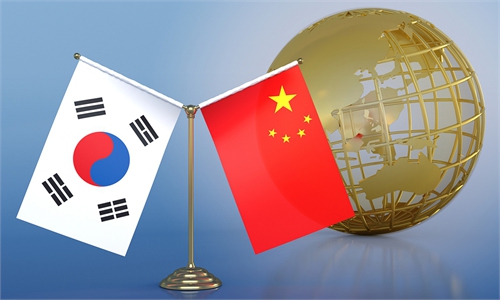
Illustration: Xia Qing/GT
A South Korean Foreign Ministry official recently revealed that the ninth China-Japan-ROK Leaders' Meeting is tentatively scheduled to be held in Seoul from May 26 to 27. Foreign Minister of the ROK Cho Tae-yul is paying a visit in China from May 13 to 14. South Korea, as the host country, is clearly eager to use the summit to urgently adjust its relations with China.For South Korea, hosting the China-Japan-ROK Leaders' Meeting was once a consensus among both ruling and opposition parties. The proactive stance of the Yoon Suk-yeol government is not surprising.
First, following the failure of the ruling party in the April legislative elections, the Yoon government has begun to earnestly discuss diplomatic adjustments, including promoting stable and long-term relations with China. It seeks to utilize the trilateral leaders' meeting to signal the promotion of multilateral cooperation, reclaiming South Korea's position as a diplomatic coordinator on global arena.
Second, amid the growth of South Korea's economy, the importance of concepts and elements from China has been increasingly prominent. The mutually dependent relationship between China and South Korea has served as the cornerstone of their 30-year friendship.
Third, the current South Korean government's intention to mend relations with China is evident. Since Yoon took office two years ago, there have been subtle changes in China-South Korea relations amid South Korea's pursuit of becoming a global pivot nation with value-based diplomacy. As the administration enters its third year, Seoul has once again recognized the importance of engaging in balanced diplomacy.
However, Japanese politicians are very clear that their country could seize opportunities and avoid harm if it maintains an appropriate distance from the US in the trend of China-US competition and uses the China, Japan and South Korea trilateral leaders' meeting to flexibly handle relations with China.
First, the yen has experienced a depreciation, leading to deteriorating living conditions for the majority of Japanese people, exacerbated by factors such as escalating food prices. In this trend, easing and improving relations with China, the country's largest trading partner, is not only a necessary answer to the diplomatic test but also its economic recovery.
Second, the approval rating of Prime Minister Fumio Kishida's Cabinet is not good. Although Kishida's support has improved to a certain extent since returning from his visit to the US, the opposition party has won a landslide victory in three by-elections in constituencies in Tokyo and the prefectures of Shimane and Nagasaki. For Kishida's domestic predicament, it seems that only improving relations with China can be used as a trump card.
Third, a Japanese economic delegation visited China in January this year. This not only sent a signal that the Japanese government wants to maintain a healthy and stable relationship with China but also amplified the desire of the Japanese business community to further promote economic and trade cooperation between China and Japan.
Clearly, Japan and South Korea have a significant consensus on restarting the China-Japan-South Korea leaders' meeting, managing differences among the three countries and meeting each other half way. Restarting trilateral leaders' meeting is not only vital for the long-term development of trilateral relations but also determines the creation of a new situation of trust and cooperation, which will bring significant benefits to regional exchanges and cooperation in East Asia.
From the perspective of exploring greater potential in cooperation, the cooperation between China, Japan and South Korea will have a profound impact on economic and trade cooperation and cultural exchanges in East Asia. Especially since China, Japan and South Korea are all members of the Regional Comprehensive Economic Partnership (RCEP), the three countries can draw on the experience of RCEP to establish a new mechanism for exploring new models of trade cooperation among China, Japan and South Korea.
China, Japan, and South Korea play a vital role in the global economy. They also have the potential to enhance communication and exchange in areas such as culture, tourism, and grassroots interactions. Collaboration in emerging fields like the digital economy and artificial intelligence offers the opportunity for shaping a cultural, digital, and smart East Asia.
The author is a researcher at the Institute of Northeast Asian Studies at Heilongjiang Provincial Academy of Social Sciences and the chief expert of the Northeast Asia Strategic Research Institute. opinion@globaltimes.com.cn


